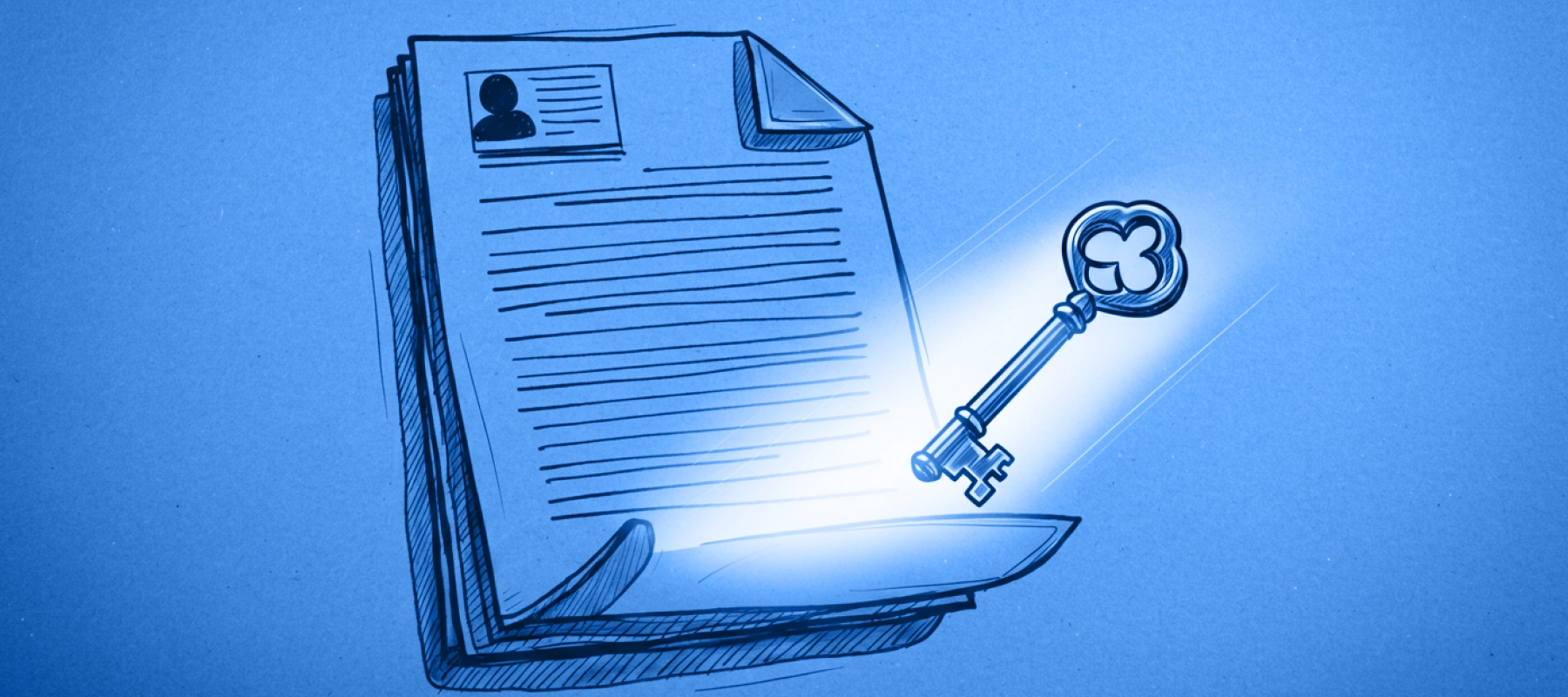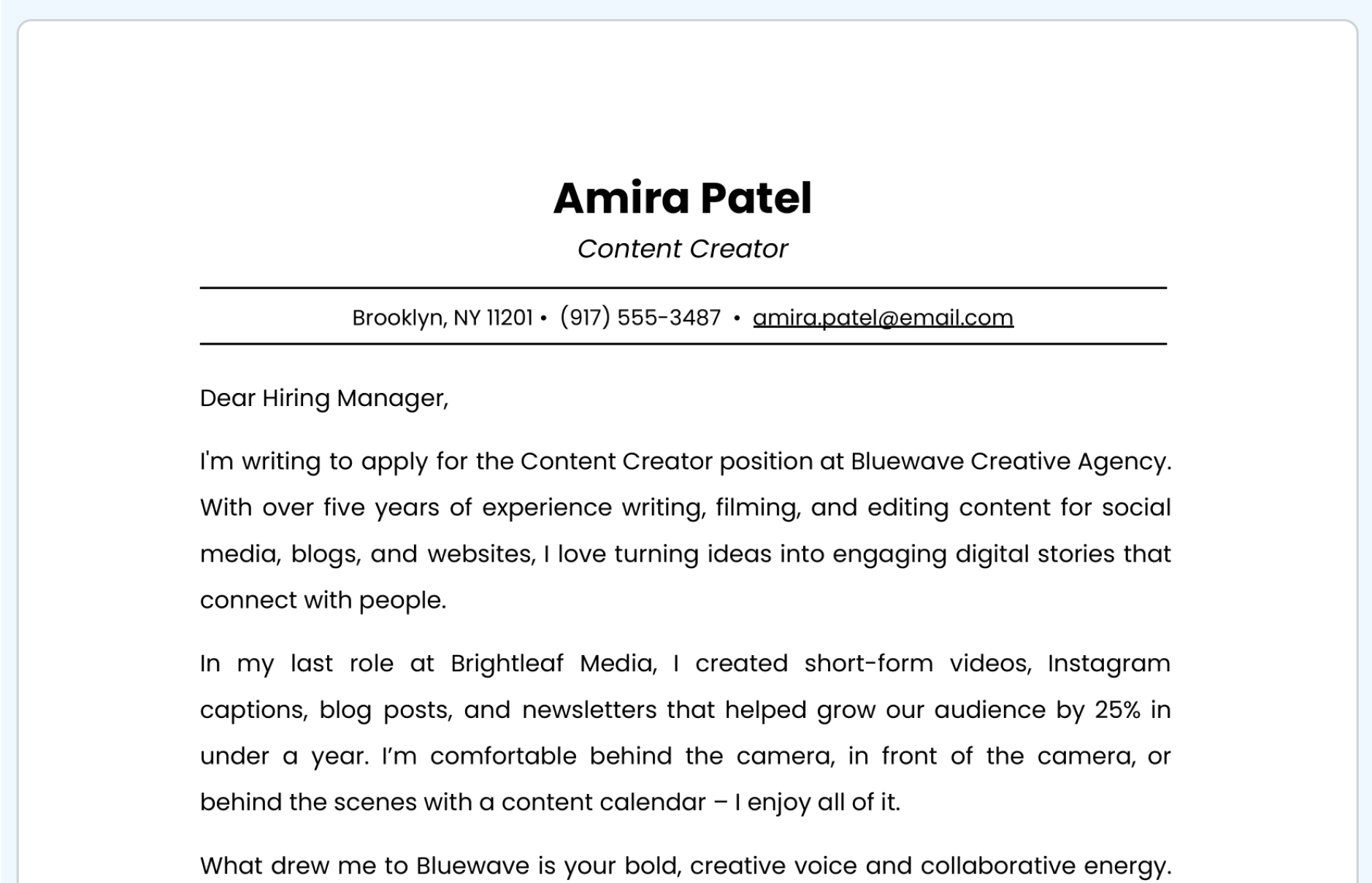Why Your Cover Letter Ending Matters
The closing paragraph of your cover letter serves as your last chance to establish a favorable impression. Understanding how to close a cover letter effectively allows you to distinguish yourself from other candidates. Your body section needs to demonstrate why you want this position through your qualifications which will motivate the employer to contact you. A brief and considerate conclusion enables you to distinguish yourself through professional conduct and exactness in your work.
You should modify your writing tone based on the company culture by using energetic language for creative agencies and adopting a more professional tone for conventional businesses. A basic call to action such as “I look forward to the chance to discuss how my skills can help your team” demonstrates initiative and maintains an open path to further discussions.
How to Craft the Closing Paragraph of Your Cover Letter
Your conclusion must present a truthful wrap‑up of all the content you have previously discussed. A well-written cover letter closing paragraph ties your enthusiasm and qualifications together. Your closing paragraph must connect smoothly with the preceding content of your letter while showing your qualifications for the position and outlining your forthcoming steps.
- Start by stating your sustained enthusiasm for both the position and organization by using your own personal words;
- Show them which particular skills and experiences match their requirements;
- Express your willingness to talk more about the matter because it shows you want to move forward;
- Include a personal touch in your writing which proves that you understand the company values and fundamental organizational principles.
When a company stands for innovation you can link this quality to your personal method of solving problems. Through your research you showed that you have completed your homework and your interest looks authentic.
- The final message should end with a basic expression of appreciation.
The message will become professional and memorable because you thank them for their time and show interest in keeping the conversation going.
Tips for Writing an Effective Cover Letter Ending
A strong cover letter ending ensures the hiring manager remembers your application for the right reasons.
Your cover letter needs to end with a positive conclusion. A thoughtful cover letter conclusion highlights your enthusiasm and leaves the reader with confidence in your fit, which demonstrates your assurance to the reader.
A proper conclusion combines all elements of your application by showing your eagerness for the position and restating your qualifications and gratitude for application evaluation. You should use fundamental phrases which start with "I value your evaluation" and end with "I anticipate discussing my application further" to maintain both professionalism and sincerity in your tone.
You also need to add a gentle invitation for further conversation through both showing eagerness about upcoming talks and letting readers reach out for additional information. Such final section demonstrates both assurance and respect which maintains the possibility of future discussions.
Connect your skills to the role
In your closing, try to draw a clear line between your strengths and what the job is asking for. A thoughtful cover letter closing connects your strengths directly to the role.The employer can better see your suitability for the position through this method. You should highlight your project management expertise by showing your background in directing complicated projects which you completed on schedule and under budget according to the job requirements.
Remind them why you're qualified
Summarize your qualifications in brief terms yet refrain from repeating your resume content word for word. Your application gains visibility when you highlight important accomplishments alongside relevant professional experiences that demonstrate your suitability for the position.
Show enthusiasm for the role and company
Show genuine excitement about becoming part of the company. Ending a cover letter on a positive and enthusiastic note helps leave a lasting impression. Organizational goals and cultural environment draw employers toward candidates who have the required qualifications as well as genuine interest in their organization.
State your goals and set expectations
You should state your intended achievements after hiring alongside your desire to discuss your potential contributions. Employers value candidates who demonstrate forward-thinking abilities and show initiative in their work approach.
Use a professional tone
Maintain professional language throughout your final words. A strong first impression depends on using professional language instead of informal words or slang.
Keep it short and sweet
Your closing paragraph should be concise because a short message delivers more power than a long one. A three to four sentence conclusion should deliver your message effectively without making the reader feel overwhelmed.
Thank them for their time and consideration
You should express gratitude to readers who have spent their time reviewing your application. Closing a cover letter with gratitude leaves a respectful and professional impression. Expressing gratitude to someone demonstrates your proper conduct along with your recognition of their value.
Choose the right complimentary close
Choose a closing phrase which suits both your letter tone and the industry you are communicating with. “Sincerely,” “Best regards” and “Kind regards” function as typical sign-offs. The informal sign-off “Cheers” is appropriate only when you understand the company culture because it represents casual communication.
Use a smart sign off
Your full name should follow your complimentary close statement. A hard copy submission requires a signature space between the typed name. Email submissions allow a typed name but you should add contact details underneath it.
Proofread before you send
Careful proofreading ensures your cover letter endings remain professional and mistake-free.
Your cover letter professionalism diminishes when you make closing errors as well as errors throughout the letter. Make sure you check every word for spelling errors and both grammar and punctuation issues. Having someone else inspect your letter or reading it aloud can identify errors that you might not notice on your own.
Smart Cover Letter Closing Examples
Reviewing different cover letter closing examples can inspire the right tone for your own letter. The following closing paragraphs demonstrate effective application of the provided advice:
Sample Cover Letter Template
Below is an example of a complete cover letter to give you a clear picture of how all the parts come together.
Cover Letter Sign-Off and Signature
Your cover letter ends with the sign-off section. A suitable complimentary close should be chosen before you add a signature space when printing your letter. The next step is to write your full name. For email applications you should only use your name and possibly add your phone number along with your LinkedIn profile link to make contact easier.
Common Mistakes to Avoid When Ending a Cover Letter
A single error in your closing statement, even a small mistake in your cover letter closing, can reduce the overall value of your application submission. The key to creating an effective cover letter conclusion involves avoiding these typical mistakes:
- Being too vague – a weak cover letter ending like “Thanks for your time” doesn’t show enthusiasm or fit.
- Sounding overly pushy – turning your cover letter ending paragraph into a demand for an interview feels unprofessional.
- Repeating your entire resume – your closing a cover letter section should be short and focused, not a second work history.
- Forgetting gratitude – skipping a simple thank-you leaves your cover letter closing flat and abrupt.
- Using casual or jokey language – lighthearted cover letter endings like “Catch you later” can make you seem less serious.
Conclusion
Mastering the art of closing your cover letter will help you get an interview. Alongside writing a strong letter, using our job application tracker can help you stay organized during your search. You will create a powerful final impression by demonstrating your skills for the position while showing eagerness and staying professional which will lead employers to contact you for further discussions.
.svg)

















